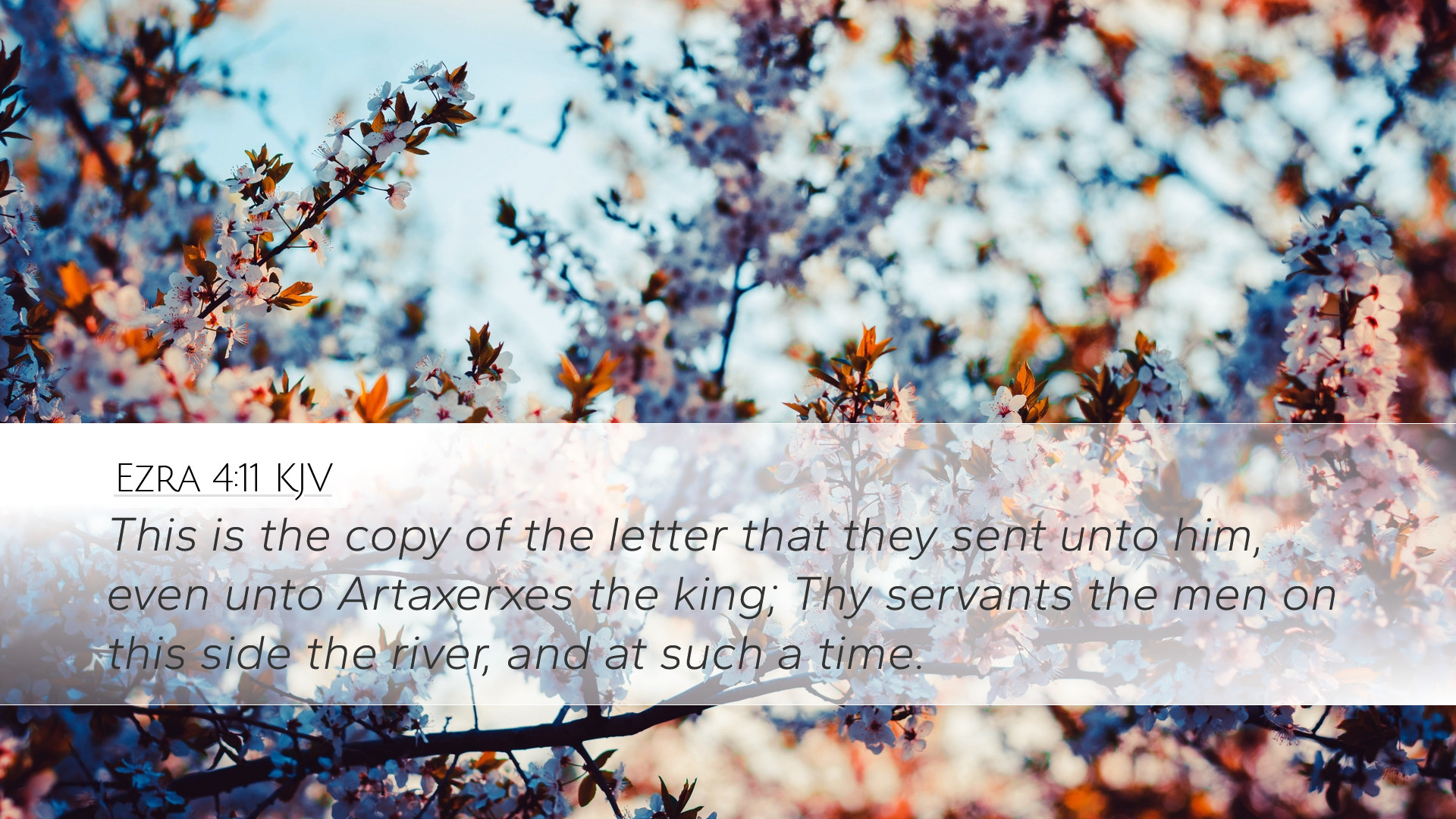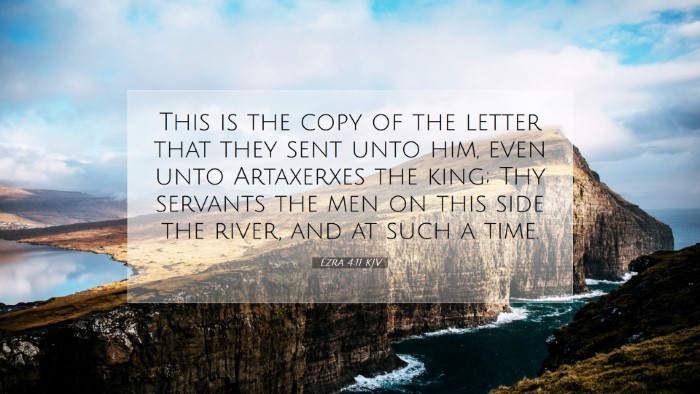Old Testament
Genesis Exodus Leviticus Numbers Deuteronomy Joshua Judges Ruth 1 Samuel 2 Samuel 1 Kings 2 Kings 1 Chronicles 2 Chronicles Ezra Nehemiah Esther Job Psalms Proverbs Ecclesiastes Song of Solomon Isaiah Jeremiah Lamentations Ezekiel Daniel Hosea Joel Amos Obadiah Jonah Micah Nahum Habakkuk Zephaniah Haggai Zechariah MalachiEzra 4:11
Ezra 4:11 KJV
This is the copy of the letter that they sent unto him, even unto Artaxerxes the king; Thy servants the men on this side the river, and at such a time.
Ezra 4:11 Bible Commentary
Bible Commentary on Ezra 4:11
Verse: Ezra 4:11 - "This is the copy of the letter that they sent unto him, even unto Artaxerxes the king; Thy servants the men on this side the river, and at such a time."
Contextual Overview
The book of Ezra depicts the return of the Jewish exiles from Babylon and the rebuilding of the temple in Jerusalem. Ezra 4 recounts the opposition faced by the returning exiles from those who remained in the land during the Exile. The passage deals with letters sent to the Persian king Artaxerxes, which articulate accusations against the restoration efforts of the Jews.
Commentary Summary
Matthew Henry's Perspective
Matthew Henry emphasizes the significance of this letter as a formalized account of opposition against the Jews. He notes that the letter plays a crucial role in illustrating how enemies had conspired to hinder the reestablishment of God's people. Henry points out that such opposition reflects the ongoing spiritual and physical conflicts faced by believers throughout biblical history.
Key Insights:
- Recognition of Authority: The letter addresses Artaxerxes, which signifies the legal and political structure within which the exiles operated.
- Cunning Accusations: The adversaries used careful language, possibly manipulating facts to sway the king's perception against the Jews.
- Divine Sovereignty: Despite the opposition, the overarching narrative demonstrates God's control and purpose, even through adversarial actions.
Albert Barnes' Commentary
Albert Barnes' commentary focuses on the nature of the challenges faced by the Jewish community upon their return. He highlights how the letter serves not only to report on the activities of the Jews but also to alert the king to the potential unrest that could arise from the Jewish restoration efforts. Barnes argues that the political implications of this letter are crucial to understanding the historical context of the rebuilding efforts.
Key Insights:
- Political Landscape: The accusations presented in the letter reflect the unstable political situation of the time, where returning exiles could easily be viewed with suspicion by those already in place.
- Call for Vigilance: There is an implicit warning in the letter suggesting that the restoration of Jerusalem's walls and temple could lead to rebellion.
- Need for Divine Intervention: Barnes emphasizes a theme of reliance on God’s guidance amid threats, highlighting the need for prayer and discernment in difficult times.
Adam Clarke's Contributions
Adam Clarke expands upon the implications of this letter upon the promise of restoration for the Jews. He notes that it’s essential to understand the tone and purpose of the letter within the broader context of the exiles' return. Clarke addresses the fact that the letter showcases the tension between the people of God and worldly authorities, a theme that resonates through history.
Key Insights:
- Historical Significance: Clarke reiterates the importance of understanding political correspondence in ancient histories and its effect on community morale.
- Faith in Difficult Times: He asserts that the response of the Jewish people can serve as an example of faith under the pressure of external opposition.
- Misunderstandings of the Jews' Intentions: Clarke remarks on how adversaries often misrepresented the intentions of the Jewish returnees, leading to unjust accusations.
Theological Implications
The narrative surrounding Ezra 4:11 provides profound theological insights relevant for pastors, students, and theologians today. It serves as a reminder of the enduring theme of struggle between faith and opposition, emphasizing the resilience of God's people throughout history.
Perseverance in Faith
Ezra 4:11 exemplifies the conflicts that arise when God's people attempt to fulfill His will in a hostile environment. This serves as a powerful encouragement for believers to persevere in their faith, trusting that God’s purposes will prevail regardless of opposition.
The Role of Authority
The interaction with Artaxerxes in this verse illustrates the complex relationship between God’s kingdom and earthly authorities. It challenges believers to engage with political structures thoughtfully while remaining grounded in their faith.
Hope Amidst Opposition
Ultimately, this verse, and the surrounding context, call believers to maintain hope amidst trials. Just as God provided a way for the Jews to return and rebuild, He continues to work in and through His people today, ensuring that His plans for redemption remain intact.


